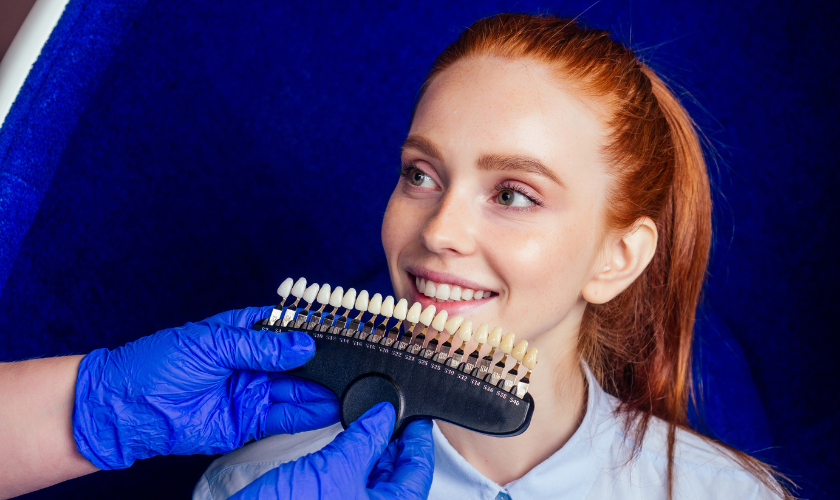943 Finchley Rd, London NW11 7PE
Are Veneers a Good Solution for Crooked Teeth?
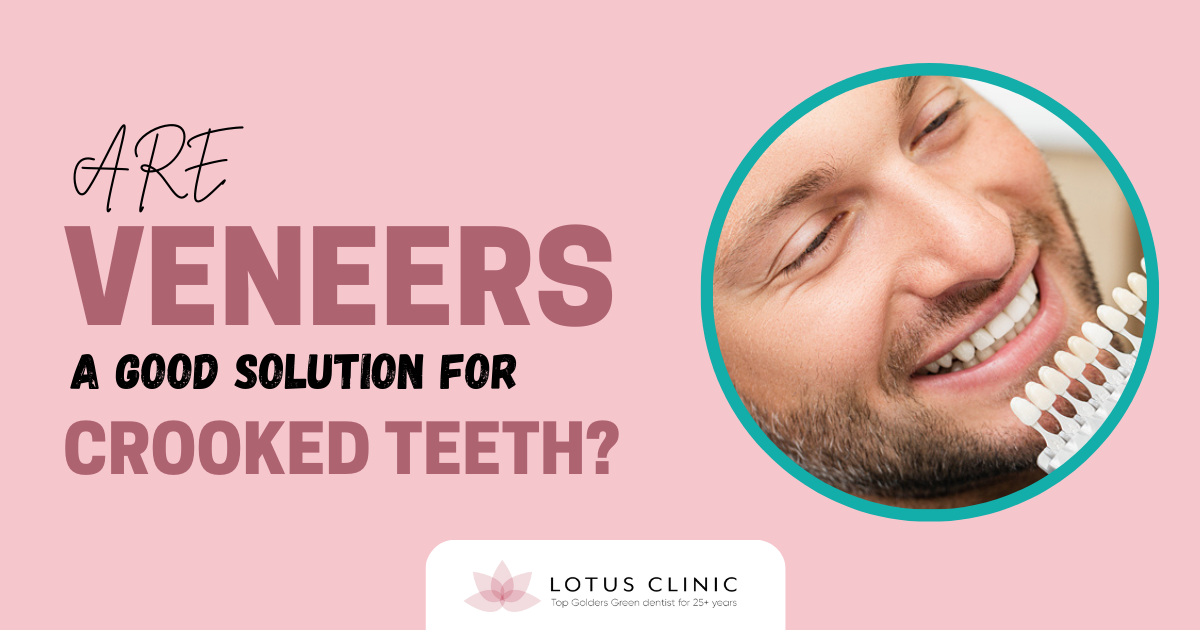
Are you dreaming of a straighter smile without the hassle of traditional braces? Dental veneers might just be the solution you’re looking for. These slim, custom-made shells can cover imperfections and give you a flawless smile in no time.
But are veneers the right choice for crooked teeth, or are there better options?
In this blog, we’ll explore how veneers work, their benefits, and whether they can really tackle crooked teeth effectively. We’ll dive into the pros and cons, compare veneers with other treatments, and guide you on what to expect during the procedure.
If you’ve been pondering whether veneers are a good fit for you, keep reading to find out how they stack up and what you should consider before making a decision. Your perfect smile might be closer than you think!
What Are Dental Veneers?
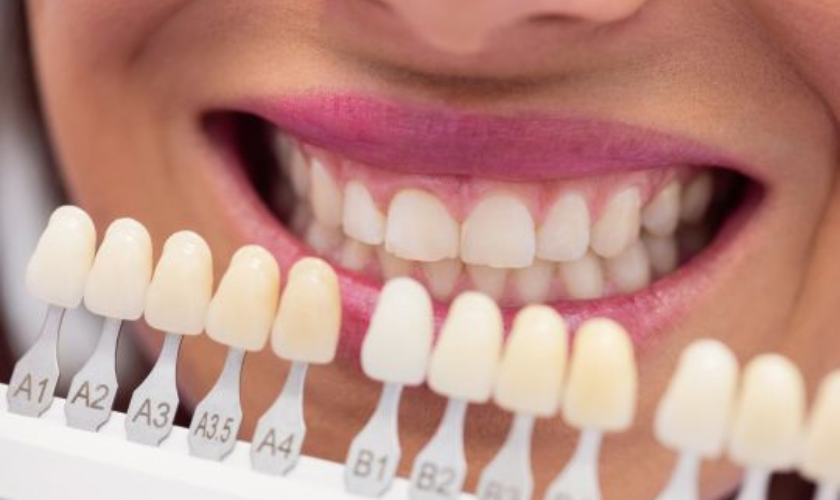
Dental veneers are thin, custom-made shells designed to cover the front surface of your teeth. They can correct a variety of issues like chipped teeth, discolouration, and misalignment. Made from porcelain or composite resin, veneers provide a natural look and are designed to blend seamlessly with your existing teeth. They are a popular choice for those looking to enhance their smile without extensive orthodontic treatment.
Veneers are applied to the visible parts of your teeth, masking imperfections and giving you a straight, even smile. They are crafted to match the colour and shape of your natural teeth, ensuring a flawless appearance. However, it’s important to remember that veneers mainly address cosmetic issues and may not be suitable for severe misalignment or structural problems.
Benefits of Veneers for Crooked Teeth
Veneers offer several advantages for those with crooked teeth:
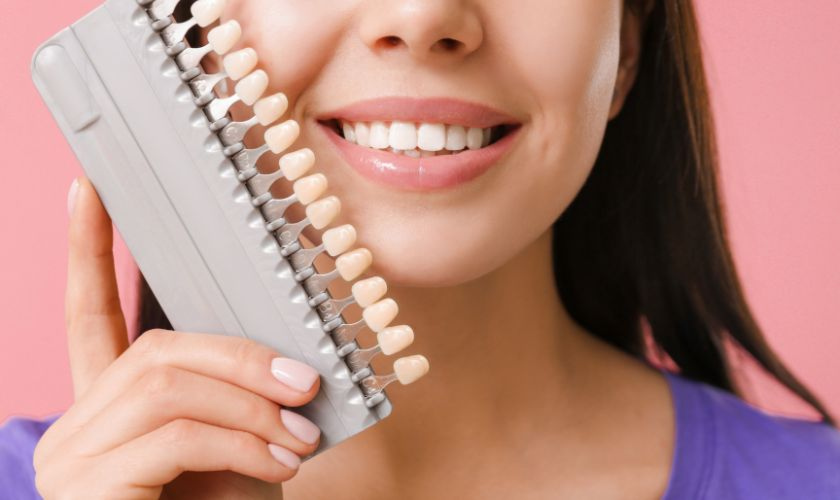
- Quick Transformation: Veneers can quickly correct the appearance of crooked teeth, often in just a few visits.
- Minimal Invasiveness: The procedure involves minimal tooth preparation compared to braces or other orthodontic treatments.
- Natural Look: Veneers are custom-made to match your natural teeth, providing a seamless and natural-looking result.
- Durability: Porcelain veneers are strong and resistant to stains, making them a long-lasting option.
While veneers are effective for minor crookedness and cosmetic improvements, they might not be the best choice for significant alignment issues. It’s crucial to discuss your specific needs with a dental professional to determine if veneers are the right solution for you.
Comparing Veneers with Other Treatment Options
When considering veneers for crooked teeth, it’s crucial to compare them with other available treatments to find the best solution for your needs.
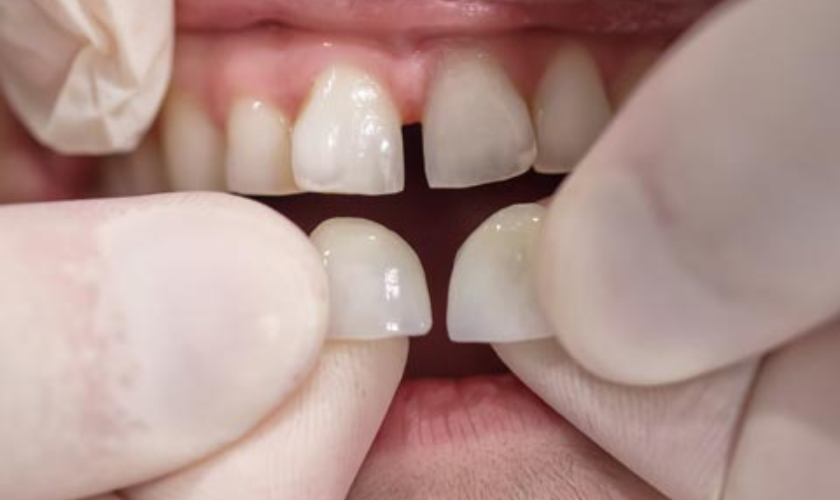
1. Traditional Braces
- Pros: Effective for severe misalignments and can correct the underlying issues causing crooked teeth.
- Cons: Requires a longer treatment time and can be uncomfortable with noticeable brackets and wires.
2. Invisalign
- Pros: Offers a more discreet treatment option with removable aligners. Ideal for mild to moderate misalignments.
- Cons: Not suitable for severe cases and requires discipline to wear aligners as directed.
3. Orthodontic Appliances
- Pros: Includes options like expanders and retainers that can help with specific alignment issues.
- Cons: Often used in combination with other treatments and may not provide the same aesthetic results as veneers.
4. Bonding
- Pros: A quick and cost-effective way to improve the appearance of crooked teeth.
- Cons: Typically used for minor adjustments and may not last as long as veneers.
Veneers can be a great choice for improving the appearance of your smile quickly, but it’s essential to weigh these options to decide what will work best for your dental needs. Each option has its advantages and is suited to different levels of misalignment. Your choice will depend on factors like the degree of crookedness, treatment time, and personal preferences. Consulting with a dental professional can help you make an informed decision.
Veneers vs. Traditional Orthodontic Treatments
When considering veneers for crooked teeth, it’s essential to compare them to traditional orthodontic treatments to understand their advantages and limitations.

Advantages of Veneers
- Immediate Results: Veneers can correct the appearance of crooked teeth almost immediately, giving you a straightened smile without months of braces.
- Minimal Discomfort: Unlike braces, which can cause discomfort over time, veneers involve minimal discomfort and a quicker recovery period.
- Aesthetic Improvement: Veneers are designed to enhance the visual appeal of your smile, making them a great choice for individuals primarily concerned with the appearance of their teeth rather than functional issues.
Limitations of Veneers
- Not a Substitute for Braces: Veneers can mask crookedness but do not address underlying dental alignment or bite issues that orthodontics can correct.
- Durability: While veneers are durable, they might not withstand heavy pressure from severe misalignment or extensive teeth movement.
- Cost: Veneers can be more expensive than traditional braces or aligners, especially when multiple teeth are involved.
When to Choose Veneers?
- Minor Misalignment: Veneers are ideal for individuals with minor crookedness or aesthetic concerns who seek a quick and effective solution.
- Cosmetic Focus: If your primary goal is to improve the appearance of your teeth and you’re less concerned with long-term structural changes, veneers might be the right choice.
Long-Term Considerations of Choosing Veneers for Crooked Teeth
Opting for veneers as a solution for crooked teeth requires careful thought about how they fit into your long-term dental health and maintenance plan. Here’s what you should keep in mind:

Longevity and Durability
- Veneer Lifespan: Veneers are designed to last between 7 to 15 years with proper care. However, their longevity can be affected by factors such as oral hygiene, bite pressure, and lifestyle habits.
- Durability Issues: While veneers are strong, they can be prone to chipping or cracking if subjected to excessive force. It’s essential to avoid habits like nail-biting or chewing on hard objects.
Impact on Natural Teeth
- Enamel Removal: Applying veneers typically involves removing a thin layer of enamel from your natural teeth. This process is irreversible and might affect your teeth’s sensitivity.
- Future Treatments: If you ever need additional dental work in the future, such as root canals or fillings, it might be more complex with veneers in place.
Regular Maintenance
- Dental Check-ups: Regular visits to your trusted dentist in Golders Green are crucial to monitor the condition of your veneers and ensure your overall dental health remains in good shape.
- Oral Hygiene: Maintaining excellent oral hygiene is vital. This includes brushing twice daily, flossing regularly, and using mouthwash to prevent issues that could affect both your veneers and natural teeth.
Potential for Adjustments
- Adjustments and Replacements: Over time, you might need adjustments or replacements for your veneers to address changes in your teeth or any wear and tear.
Veneers can be a fantastic option for improving the appearance of crooked teeth, offering a quick and effective cosmetic solution. They provide a natural-looking, aesthetically pleasing smile with minimal discomfort and time commitment. However, they may not address severe alignment issues. For the best results, consult with a dental professional to determine if veneers are right for you. With the right care, they can transform your smile and boost your confidence.



